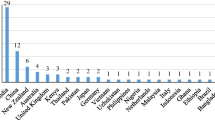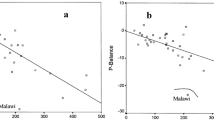Abstract
The crisis in Indian agriculture, which has been building up for decades, is not one of declining profitability, but a more basic one of the bulk of its holdings being non-viable. Not only the number of these holdings, but even the extent of non-viable land in the total area is fast increasing and will dominate agriculture unless the trend is reversed. Merely increasing the productivity of small holdings has not helped much. Non-viability comes in the way of capital formation in agriculture and its dynamic growth. The main culprit behind this situation is that employment opportunities in non-agricultural sectors are not growing fast enough. In an international perspective, Indian situation is among the worst. It needs urgent attention. A number of steps are suggested.
Similar content being viewed by others
References
Ballabh V, Batra P (2016) Farmers in distress and resources under stress: a completely neglected subject, In: Ramasamy and Ashok (Eds), pp 377–400
Birthal PS et al (2014) How sensitive is Indian agriculture to climate change? Indian J Agric Econ (IJAE) 69(4):474–487
Chandrakanth MG (2015) Water resource economics—Towards a sustainable use of water for irrigation in India. Springer, New Delhi
Chandrakanth MG, Alamelu B, Bhat MG (2004) Combating negative externalities of drought: ground water recharge through watershed development programme. EPW 39(11):1164–1170
Chaudhury S, Roy M (2016) Halting desertification, Deccan Herald, November 15, p 10 (Edit page)
Dandekar VM (1976) Crop Insurance in India, EPW, September 26, Review of Agriculture
Dandekar VM (1994) Transforming Traditional Agriculture—A Critique of Professor Schultz (revised from first published in EPW 1966), The Indian Economy 1947–92, Vol. 1: Agriculture. New Delhi: Sage. pp 96–126
Deshpande RS, Arora S (eds) (2010) Agricultural crisis and farmer suicides. Sage, New Delhi
Deshpande RS, Raveendra Naika T (2004) Moon in the mirror: farmers and minimum support prices in Karnataka. Bangalore: Institute for Social & Economic Change, Monograph 7
Joshi PK (2015) Has Indian Agriculture Become Crowded and Risky? Status, Implications and the Way Forward, IJAE, 70(1), January-March, pp 1–41
Joshi V (2016) India’s long road: the search for prosperity. Allen Lane, Gurgaon
Nadkarni MV (2015) Gandhi’s civilizational alternative and dealing with climate change. J Soc Econ Dev 17(1):90–103
Nadkarni MV (2016) Indian agriculture through challenges—Old and New, In: Ramasamy and Ashok (Eds), pp 71–85
Narayanamoorthy A, Deshpande RS (2005) Where Water Seeps!—Towards a New Phase in India’s Irrigation Reforms. New Delhi: Academic Foundation
Parel A (ed) (2010) Gandhi—Hind Swaraj and other writings. Cambridge University Press, New Delhi
Ramesh J, Khan MA (2016) Winking at the States, The Hindu, November 2, p 10 (Edit page)
Rao VKRV (1983) India’s national income—1950–80. Sage, New Delhi
Rao VM (1994) Farmers in market economy: would farmers gain through liberalisation? IJAE, 49(3), July-September
Rao VM, Hanumappa HG (1999) Marginalisation process in agriculture: indicators, outlook, and policy. EPW 34(52):133–38
Sasmal J (2014) Foodgrains production in India—How serious is the shortage of water supply for future growth? IJAE 69(2):229–42
Acknowledgements
This was delivered as the 15 Prof. L S Venkataramanan Memorial Lecture at the ISEC, Bengaluru, on 14 February 2017. Thanks are due to Dr Khalil Shah of ISEC for promptly providing whatever data I requested. A modified version of this lecture was later published in the Economic and Political Weekly ,Vol 53(17), 28th April 2018, pp. 28-34. We thank EPW for permitting us to publish the lecture in the Journal of Social and Economic Development.
Funding
There is no funding provided for this article.
Author information
Authors and Affiliations
Corresponding author
Ethics declarations
Conflict of interest
There is no conflict of interest.
Additional information
Publisher's Note
Springer Nature remains neutral with regard to jurisdictional claims in published maps and institutional affiliations.
L.S. Venkataramanan Memorial Lecture; This lecture was delivered by Prof. M V Nadkarni at the Institute for Social and Economic Change, Bangalore (ISEC) as LSV Memorial Lecture on February 14, 2017. The article was submitted to ISEC on that occasion for possible publication and circulation. This lecture is presented here in its original version.
Rights and permissions
Springer Nature or its licensor holds exclusive rights to this article under a publishing agreement with the author(s) or other rightsholder(s); author self-archiving of the accepted manuscript version of this article is solely governed by the terms of such publishing agreement and applicable law.
About this article
Cite this article
Nadkarni, M.V. Crisis in Indian agriculture: can it be overcome?. J. Soc. Econ. Dev. 24 (Suppl 1), 228–241 (2022). https://doi.org/10.1007/s40847-022-00202-3
Published:
Issue Date:
DOI: https://doi.org/10.1007/s40847-022-00202-3




